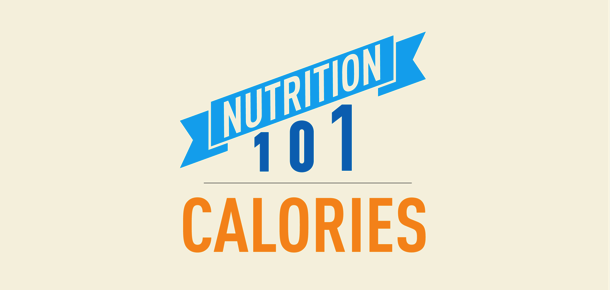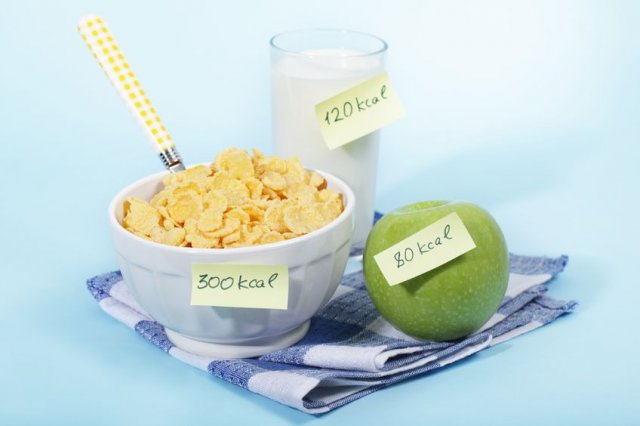
What Is a Calorie?
At a very basic level, a calorie is simply a unit of heat measurement.
You probably know that our bodies require energy to function. The food that we eat contains potential energy. Thus, we consume food as a source of energy to sustain your bodies.
Wait...potential energy?
Potential energy is energy that's stored in a physical system and has the potential to be converted into work or kinetic energy. That's right...just because we consume food, which in turn contains some amount of calories; that doesn't necessarily mean that we will utilize or convert all of those calories into work or kinetic energy.
When we consume a food source, it provides us with the basic components to nourish our bodies and provide all of the complex systems our bodies contain a source of energy to function.
Back to calories. Technically...there are two types of calories; small and large. At this point, you might be saying..."WTF? How can there be two types of calories and which type have I been eating/tracking?"
- Small calories (cal) - the amount of energy required to raise the temperature of one gram of water by 1 degree Celsius.
- Large calories (kcal) - the amount of energy required to raise the temperature of one kilogram of water by 1 degree Celsius.
The difference between the two is merely a factor of 1000, but it is an important one when you are talking about calories from food. When discussing the types of calories as it relates to food and nutrition, we will always refer to the large calories (kcal).
How Much Energy Is In My Food?
Through the use of a highly sophisticated heat measurement device called a bomb calorimeter, we can accurately determine the amount of energy a particular food source provides. Essentially this device ignites the food source via electricity and as it burns, the food heats the surrounding air. This heated air is then used to increase the temperature of water and as the water temperature rises, the amount of energy can be calculated.

Everyone's got a bomb calorimeter right? Yeah...probably not. Most of us, rely on the food labels to give us the relevant nutritional details on a food source. Given that, it is important to know how to read a nutrition label and ensure that you can make sense of food labels. Having this knowledge will make you more aware of what is going into your body and how it might affect performance in your workouts or progress towards your weight loss goals.
Amount of energy in macronutrients.
We will take a deeper dive into each of the macronutrients later in this series. However, since we are discussing calories in general here, it makes sense to detail the calories for each of the macronutrients now.
There are 3 macronutrients; protein, carbohydrates, and fats. We all have likely heard of those three at some point in the past, but do you know how many calories are in each gram of these macronutrients?
- 1 gram of protein = 4 calories
- 1 gram of carbohydrate = 4 calories
- 1 gram of fat = 9 calories
- 1 gram of alcohol = 7 calories
Again, we will be going through each of the macronutrients in greater detail in this series. To get some of that detail now, check out Wrapping Your Head Around Macros: A Cheat Sheet for an awesome resource that will help you identify food sources for each.
Note: I rarely drink alcohol, but I wanted to include it here as some of you might and I thought you might be interested to know the caloric content of alcohol as well since it falls outside of the 3 major macronutrients.
How Many Calories Do I Need?
The number of calories that each person needs on a daily basis is highly variable and several factors play a role in determining this. However, there is minimum number of calories that your body needs each and every day in order to function effectively.
This is typically expressed as BMR or RMR.
- BMR - basal metabolic rate is the minimum level of energy expenditure needed to maintain vital functions of the body.
- RMR - resting metabolic rate is very similar to BMR in that it’s measured during rest. Meaning, the level of energy required to sustain vital functions at rest.
The human body is quite complex and there are a lot of "systems" in our bodies that require energy and each of these systems acquire and consume energy in different ways. We won't get into all of the specifics here, just understand that dipping below the minimum number of calories that your body requires on a daily basis (BMR or RMR) will have a negative impact over an extended period of time.
Want to know your BMR? Use the handy calculator below to determine your BMR.
Determine Your Caloric Needs
To determine your total daily calorie needs, multiply your BMR (see calculator below) by the appropriate activity factor, as follows:
- If you are sedentary (little or no exercise) : BMR x 1.2
- If you are lightly active (light exercise/sports 1-3 days/week) : BMR x 1.375
- If you are moderately active (moderate exercise/sports 3-5 days/week) : BMR x 1.55
- If you are very active (hard exercise/sports 6-7 days a week) : BMR x 1.725
- If you are extra active (very hard exercise/sports & physical job or 2x training) : BMR x 1.9
Here is a calculator that will provide your BMR based on the Harris-Benedict equation and given your activity level, this calculator will also provide you with daily caloric needs. This method provides a reasonable estimate of normal energy expenditures for specific population sub-groups.
Calories - An Infographic
I may have mentioned this before, but I love infographics! I think that I am a visual learner and have found that infographics do a great job of conveying lots of information in an easy to read (usually...) format.
Here is an infographic that MyFitnessPal created recently that gives you a breakdown of calories. Understanding how calories affect weight loss is an important concept if you are new to the subject. Check out this infographic and comment below with how good/bad you feel this image conveys the concept of calories.
Recap
- We measure energy intake, or the potential energy present in our food, in Calories or kcals.
- Our bodies have several energy needs which include the energy required for maintenance at rest; the energy required for physical activity and movement; and the energy required for food digestion, absorption, and transport.
- Our food sources can be categorized into 3 macronutrients; protein, carbohydrates, and fat.
- Each macronutrient carries are specific number of calories per gram.
- Basal metabolic rate (BMR) or resting metabolic rate (RMR) is the amount of energy the body needs for maintenance at rest and this value varies from person to person.
Ready to Learn More?
If you want to learn more about the fundamentals of nutrition, check out the following 7-part series that I have created!
Hey, I'm Chris Coburn and I am a certified Precision Nutrition Level 1 Coach! Each week I will send you an email that will cover one easily digestible, essential building block on the fundamentals of nutrition.
The best part? They’re totally free.
To check out the free series, just click the button below.

